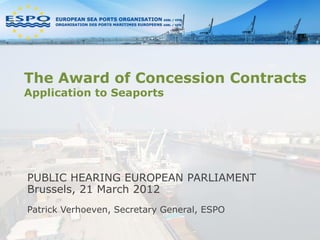2012 03-21 ep imco concessions espo verhoeven
- 1. The Award of Concession Contracts Application to Seaports PUBLIC HEARING EUROPEAN PARLIAMENT Brussels, 21 March 2012 Patrick Verhoeven, Secretary General, ESPO
- 2. Summary Diversity of applicable regimes Transparency where it matters Matching market access with continuity of investment Specific issues with EU Directive proposal
- 3. Diversity of applicable regimes Port management mostly devolved to a port authority Port authorities are ŌĆścontracting entitiesŌĆÖ with: ’é© Terminal operators (cargo-handling / passenger services) ’é© Industry and logistics (warehousing) ’é© Providers of technical-nautical services ’é© Other service providers Many service contracts involve allocation of port land Legal regimes land-related contracts very different in MS: ’é© Public law: public service contracts / domain concessions ’é© Private law: lease agreements ’é© Mixture or no particular regime
- 4. Transparency where it matters Port authorities should be able to set selection criteria that reflect commercial strategy and development policy and take into account dynamic nature port sector Transparency obligations (including use of public selection procedures) should be proportional: ’é© sufficient connection with functioning internal market ’é© exclude contracts single-user facilities (pure land lease) Durations of contracts must allow reasonable return on investment but maintain a risk inherent in exploitation Contract clauses on quality and performance of services, intra-port competition and sustainability must be possible
- 5. Current use of public selection procedures to contract port land out 28% Always 32% Only for plots of land that are of strategic interest Subject to other conditions Never 19% 21% Source: ESPO ŌĆśFact-Finding ReportŌĆÖ on Port Governance in Europe (2011)
- 6. Matching open market access with continuity of investment Prolongation of contracts should not be an unconditional and automatic right of incumbent operators But if an incumbent operator performs well and commits to continue investment, there should be scope to prolong If not, operators would typically cease all investments in the last years of the agreement Possible solutions: ’é© Anticipate prolongation options in original contract and make conditions specific ’é© Set objective parameters to make prolongation decision
- 7. Specific issues with EU Directive proposal Potential added value for port sector under discussion Scope: ’é© Will not apply to all land-related contracts (case-by-case) ’é© Clearer for technical-nautical service contracts ’é© Complementary instrument EC ports policy review (?) Threshold very low for the port sector, alternative calculcation based on surface would be better Procedural requirements are quite stringent, which may conflict with dynamic nature of the port sector Possibility for prolongation of contracts should be clearer
- 8. Thank you for your attention! Patrick Verhoeven ŌĆō Secretary General European Sea Ports Organisation (ESPO) Treurenberg 6 ŌĆō B-1000 Brussel / Bruxelles Tel + 32 2 736 34 63 ŌĆō Fax + 32 2 736 63 25 Email: patrick.verhoeven@espo.be ŌĆō www.espo.be








